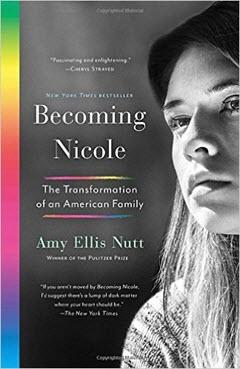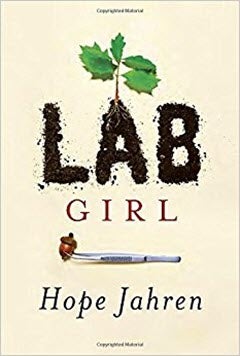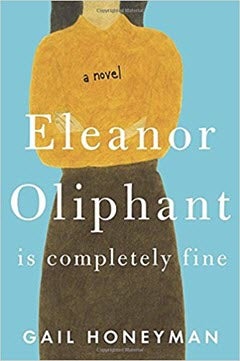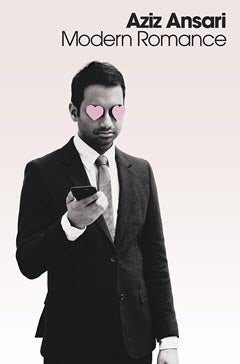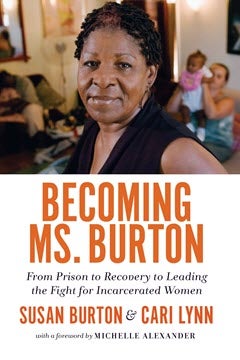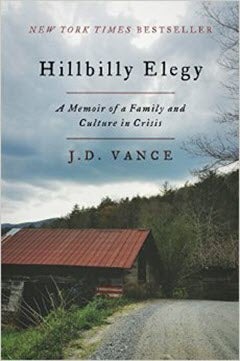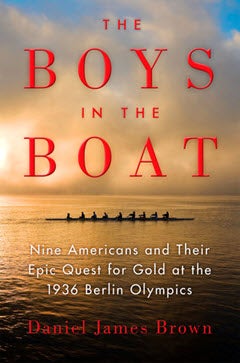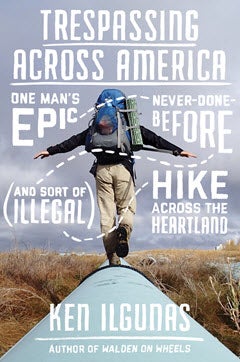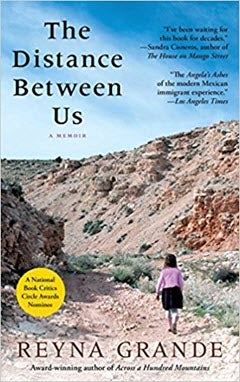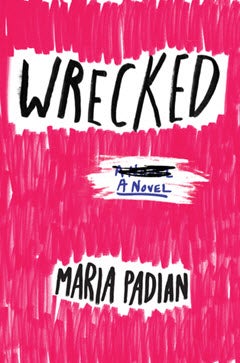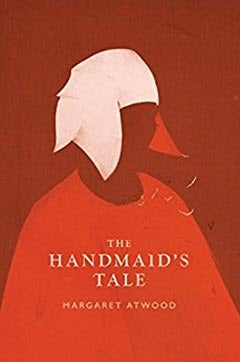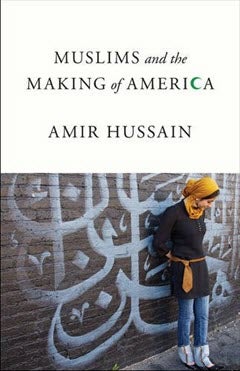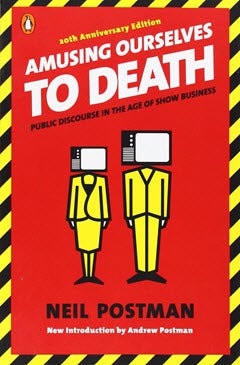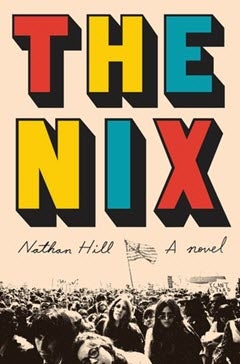Nominations for the 2018-2019 Freshman Common Reading are officially closed.
The five finalists for 2018-2019 have been chosen! They are the first five titles on the list below: Lab Girl, by Hope Jahren; Becoming Nicole, by Amy Ellis Nutt; Eleanor Oliphant is Completely Fine, by Gail Honeyman; Modern Romance, by Aziz Ansari and Eric Klinenberg; and Becoming Ms. Burton: From Prison to Recovery to Leading the Fight for Incarcerated Women, by Susan Burton and Cari Lynn.
Members of the CSUN community (students, faculty, staff, and alums) are invited to submit their opinion about any of these nominated titles to the Freshman Common Reading blog. The blog is moderated, which means your submission requires approval before it is published.
If you'd like to nominate a title for CSUN's 2019-2020 Freshman Common Reading, please read the selection criteria and then fill out our brief online nomination form. For more information, read about our nomination process.
The Winner for 2018-2019: Becoming Nicole, by Amy Ellis Nutt. 2015. 262 pages.Nominated by Susanna Eng-Ziskin From the publisher: "The inspiring true story of a transgender girl, her identical twin brother, and an ordinary American family’s extraordinary journey to understand, nurture, and celebrate the uniqueness in us all, from the Pulitzer Prize–winning science reporter for The Washington Post Susanna adds: "The books meets all the criteria and then some. There are so many contemporary issues to think about in this book, and drawing students into reading and reflection should be easy. It deals with issues of gender identity, prejudice, advocacy, the supreme court, empathy, family strife and so much more. I could see this being adopted in a variety of courses / departments / programs beyond U100, including Psychology, Queer Studies, Sociology, Human Sexuality, Journalism (the author is a Washington Post Journalist), Social Work, and Child & Adolescent Development." Review from the New York Times (excerpt): "Nicole Maines, the heroine of Amy Ellis Nutt’s “Becoming Nicole: "The Transformation of an American Family,” evinces similar conviction about her gender identity, and at an even younger age. Shortly before turning 3, when Nicole was still known as Wyatt, he declared to his father, “I hate my penis.” All the while, the Maines household was running a control group of one: Wyatt had an identical twin brother named Jonas, whose sense of his own maleness was never in doubt. Once, when they were still small, Wyatt hit Jonas. Asked why, Wyatt replied, “Because he gets to be who he is and I don’t.” More information: Faculty & Staff resource page |
Nominated by Cheryl Spector. From the publisher: Geobiologist Hope Jahren has spent her life studying trees, flowers, seeds, and soil. Lab Girl is her revelatory treatise on plant life—but it is also a celebration of the lifelong curiosity, humility, and passion that drive every scientist. In these pages, Hope takes us back to her Minnesota childhood, where she spent hours in unfettered play in her father’s college laboratory. She tells us how she found a sanctuary in science, learning to perform lab work “with both the heart and the hands.” She introduces us to Bill, her brilliant, eccentric lab manager. And she extends the mantle of scientist to each one of her readers, inviting us to join her in observing and protecting our environment. Warm, luminous, compulsively readable, Lab Girl vividly demonstrates the mountains that we can move when love and work come together." Cheryl adds: "Jahren tells the highly readable story of her life (childhood through motherhood) in short, beautifully written chapters that alternate between autobiography and science (with an emphasis on Roots and Leaves, Wood and Knots, and Flowers and Fruit). The book is by turns funny, irreverent, and (especially when she's writing about nature) flat-out fabulous. In her two-page prologue, Jahren invites the reader to gaze at a leaf--any leaf--and ask a question about it. Having done that, she explains that "You are now a scientist." Totally engaging. Watching Jahren grow, and learning from her science-y chapters, would make anyone grow intellectually. (Even me.) The book will be of interest to anyone who is a scientist (or wants to be), a doctor (or wants to be), a female, a college student, a dog-owner, or a feminist. If you like trees, and maybe even if you don't, this is a book for you. The book invites everyone on the planet to come on in. In that sense, it values diverse cultural perspectives. Significant issues include the role of science in understanding our universe; love (variously defined); education; and the future of trees. Jahren has a blog at https://hopejahrensurecanwrite.com/. Her style there is a lot like her style in the book." Review from the New York Times (excerpt): "Vladimir Nabokov once observed that “a writer should have the precision of a poet and the imagination of a scientist.” The geobiologist Hope Jahren possesses both in spades. Her engrossing new memoir, “Lab Girl,” is at once a thrilling account of her discovery of her vocation and a gifted teacher’s road map to the secret lives of plants — a book that, at its best, does for botany what Oliver Sacks’s essays did for neurology, what Stephen Jay Gould’s writings did for paleontology." Oviatt Library owns this book. |
Finalist: Eleanor Oliphant is Completely Fine, by Gail Honeyman. 2017. 336 pages. Nominated by Catherine Givertz. From the publisher: "Meet Eleanor Oliphant: She struggles with appropriate social skills and tends to say exactly what she’s thinking. Nothing is missing in her carefully timetabled life of avoiding social interactions, where weekends are punctuated by frozen pizza, vodka, and phone chats with Mummy. Catherine says: "This book is an amazing conversation starter! "Eleanor" explores many topics that would benefit freshmen. It touches on everything from loneliness and depression to the importance of budgeting. Other topics exposed: foster care system, importance of career planning, social skills, alcohol abuse, personal hygiene, and gender identity. This book feels real and is a powerful tool for reaching people in order to start potentially life changing conversations." Review from The Guardian (excerpt): "The central character of Eleanor feels instantly and insistently real, as if she had been patiently waiting in the wings for her cue all along. Most workplaces have an Eleanor: the slightly odd, plastic bag- clutching person who scuttles away from all communal enterprises; who rarely says a word that isn’t about the matter in hand; whose home life can only be speculated about, not always kindly. Eleanor’s entire existence is clear, orderly – and completely empty. She works all week, goes home on a Friday night, heats up a Tesco pizza, drinks two bottles of vodka and speaks to nobody until Monday morning comes round again. Given the number of books about dementia, memory loss and other mental health issues, it is surprising that it has taken profound loneliness this long to take centre stage. It is, after all, by many accounts one of the great scourges of our age, when everyone is meant to be having the most amazing time eating avocados with their friends on Instagram." Oviatt Library does not have this book. LAPL has print, ebook, and audio book copies. |
Finalist: Modern Romance, by Aziz Ansari and Eric Klinenberg. 2015. 288 pages. Nominated by Mariana Marquez. From the publisher: "But the transformation of our romantic lives can’t be explained by technology alone. In a short period of time, the whole culture of finding love has changed dramatically. A few decades ago, people would find a decent person who lived in their neighborhood. Their families would meet and, after deciding neither party seemed like a murderer, they would get married and soon have a kid, all by the time they were twenty-four. Today, people marry later than ever and spend years of their lives on a quest to find the perfect person, a soul mate. Mariana says: "Mr. Ansari's book discusses in depth about the impact of technology on the way that people in their 20s date. It has plenty of material that is relatable to college students and the generation of students who have grown with the internet and social media. It provides a substantial amount of research and poses interesting questions about how we meet and communicate with people we are romantically interested. It discusses what its like to date across different cultures by providing research conducted in different cities and comparing how culture influences dating norms. The book also talks about the concept of "emerging adulthood," which is defined as the period of time during your 20s in which you are discovering your interests, developing your career and building the foundations for the rest of your life. Overall, Mr. Ansari gives an interesting take on the difficulties and advantages of dating in the digital world as well as uses his background as a comedian to engage readers and make them laugh. I really enjoyed this book and I feel everyone can take away something from it. It would be a particularly interesting book for freshmen to read since they will be exploring their options as far as their career but also their personal lives. Given that the book discusses romance and the culture surrounding it, it could lead to more conversation about consenting to specific things when dating. Overall, a fun read with plenty of depth and wit." Review from the New York Times (excerpt): "“Modern Romance” is full of actual data; as Mr. Ansari puts it, “I also knew that I, bozo comedian Aziz Ansari, probably couldn’t tackle this topic on my own.” So he enlisted Eric Klinenberg, a sociology professor at New York University, whose own book, “Going Solo: The Extraordinary Rise and Surprising Appeal of Living Alone,” might at first glance make him, too, seem like an iffy prospect as a dating authority. But Mr. Ansari and Mr. Klinenberg applied rigor and seriousness to their subject. Their energetic research program included focus groups and interviews with hundreds of people in New York; Los Angeles; Wichita, Kan.; Monroe, N.Y.; Tokyo; Paris; and Doha, Qatar. They set up a discussion forum on the social networking site Reddit; interviewed experts; consulted books on sociology, psychology and human behavior; and dug up sober academic studies about current dating trends. The Oviatt Library does not own this book. LAPL has print, ebook, and audio copies. |
Finalist: Becoming Ms. Burton: From Prison to Recovery to Leading the Fight for Incarcerated Women, by Susan Burton and Cari Lynn. 2017, 228 pages. Nominated by Marta Lopez-Garza. From the publisher: "Susan Burton’s world changed in an instant when her five-year-old son was killed by a van driving down their street. Consumed by grief and without access to professional help, Susan self-medicated, becoming addicted first to cocaine, then crack. As a resident of South Los Angeles, a black community under siege in the War on Drugs, it was but a matter of time before Susan was arrested. She cycled in and out of prison for over fifteen years; never was she offered therapy or treatment for addiction. On her own, she eventually found a private drug rehabilitation facility. Once clean, Susan dedicated her life to supporting women facing similar struggles. Her organization, A New Way of Life, operates five safe homes in Los Angeles that supply a lifeline to hundreds of formerly incarcerated women and their children—setting them on the track to education and employment rather than returns to prison. Becoming Ms. Burton not only humanizes the deleterious impact of mass incarceration, it also points the way to the kind of structural and policy changes that will offer formerly incarcerated people the possibility of a life of meaning and dignity." Marta says: "Becoming Ms. Burton is written for a general audience. It's engaging, gripping and will draw students, including freshmen, into Susan Burton's story. In this book she shares the stark truths of her life, her healing process and eventual transformation. In the process, she skillfully weaves her experiences into the sociopolitical and economic issues of our times in this country. As such, this book encourages reflection and discussion among students and faculty across disciplines and colleges. Susan Burton is the founder of A New Way of Life Reentry Project (located in South Los Angeles) for women returning home from prison and their children. She has been a guest speaker at CSUN numerous times for departments and organizations across different colleges precisely because of her amazing accomplishments on behalf of the incarcerated and formerly incarcerated nationwide. I believe many of our students will not only find her story compelling but will also identify with the issues she has faced in her life." Publicity about the book (from Marta): Former Inmate Leads Women From Prison To Recovery from Terry Gross’ Fresh Air in Podcasts. https://itunes.apple.com/us/podcast/fresh-air/id214089682?mt=2#episodeGuid=22effbcc-65e4-4ffd-859b-be5971644c88 Nicholas Kristof in The New York Times - https://www.nytimes.com/2017/05/04/opinion/susan-burton-modern-day-harriet-tubman.html?_r=0 Review from Publisher's Weekly: "Burton founder and executive director of A New Way of Life, a nonprofit organization that supports formerly incarcerated women, joins coauthor Lynn (Leg the Spread) to write a compelling memoir about her own journey into social justice activism after multiple imprisonments. A survivor of domestic violence and sexual assault during her childhood, Burton turned to cocaine and crack after her five-year-old son was killed in a hit-and-run incident. Once caught up in California’s prison system, she spent nearly two decades incarcerated or on parole before she was able to break the cycle by fighting for the drug treatment and trauma therapy she needed. The latter half of the book documents Burton’s tireless efforts to effect change—first helping individual women, released from prison with few resources, to make a new start, and then snowballing advocacy efforts at the state and national level to reshape how the United States treats those with criminal records. Too often, national debates about mass incarceration take place in the abstract world of economics or social science data; rarely do individuals who have been or are currently incarcerated have a place at the policy table. This first-person account of the trauma that incarceration inflicts on individuals and families ties those policy discussions to lived reality. It may also help the incarcerated, the formerly incarcerated, and their families know that they are not alone." Oviatt Library does not own this book. LAPL has some print copies. |
From the back cover: From a former marine and Yale Law School graduate, a probing look at the struggles of America’s white working class through the author’s own story of growing up in a poor Rust Belt town. Hillbilly Elegy is a passionate and personal analysis of a culture in crisis—that of poor, white Americans. The disintegration of this group, a process that has been slowly occurring now for over forty years, has been reported with growing frequency and alarm, but has never before been written about as searingly from the inside. In Hillbilly Elegy, J.D. Vance tells the true story of what a social, regional, and class decline feels like when you were born with it hanging around your neck. The Vance family story began with hope in postwar America. J.D.’s grandparents were “dirt poor and in love” and moved north from Kentucky’s Appalachia region to Ohio in the hopes of escaping the dreadful poverty around them. They raised a middle-class family, and eventually one of their grandchildren would graduate from Yale Law School, a conventional marker of success in achieving generational upward mobility. But as the family saga of Hillbilly Elegy plays out, we learn that J.D.’s grandparents, aunt, uncle, sister, and, most of all, his mother struggled profoundly with the demands of their new middle-class life, never fully escaping the legacy of abuse, alcoholism, poverty, and trauma so characteristic of their part of America. With piercing honesty, Vance shows how he himself still carries around the demons of his chaotic family history. A deeply moving memoir, with its share of humor and vividly colorful figures, Hillbilly Elegy is the story of how upward mobility really feels. And it is an urgent and troubling meditation on the loss of the American dream for a large segment of this country. Amita adds: This book chronicles an inspiring journey from challenging personal circumstances to an Ivy League law school. I really liked the author's ability to step back and reflect on what he could do to change the trajectory of his life. I was completely unaware of how poverty plays out in the United States, and it made me more aware of the world around me. Review from the New York Times (excerpt): ""Hillbilly Elegy," in my mind, divides into two components: the family stories Mr. Vance tells — most of which are no doubt better experienced on the page than they were in real life — and the questions he raises. Chief among them: How much should he hold his hillbilly kin responsible for their own misfortunes? In Mr. Vance’s estimation, the answer is: a lot. Economic insecurity, he’s convinced, accounts for only a small part of his community’s problems; the much larger issue is hillbilly culture itself. Though proud of it in many ways, he’s also convinced that it "increasingly encourages social decay instead of counteracting it."" Oviatt Library owns this book. |
Nominated by Debbi Mercado. From the publisher: For readers of Unbroken, out of the depths of the Depression comes an irresistible story about beating the odds and finding hope in the most desperate of times—the improbable, intimate account of how nine working-class boys from the American West showed the world at the 1936 Olympics in Berlin what true grit really meant. Debbi says: "This historical non-fiction about the nine young men on the US rowing team in the 1936 Olympics is a page turner that has all the elements of a good novel: great character development, exciting plot, conflict/rivalry, and riveting suspense that keeps you up into the wee hours. I think students would find much to discuss and compare between university life then and now, including teamwork, the need for expert mentors/coaches, the life of athletes, the juggle between work, school, and extra activities, and the development of character during economically difficult times in the U.S. The story could appeal to many campus disciplines, including physics (working for the perfect stroke and team rhythm), engineering (boat construction and craftsmanship), psychology (outsmarting rival teams), sociology (the impact of the Depression on families and individuals), and history (the politics of holding the Olympics in Berlin in Nazi Germany). The book has over 19,000 reviews on Amazon, and 82% are 5-star. You don't have to be old to enjoy this story of grit, teamwork, triumph, and friendship. Set against the backdrop of The Great Depression and the events unfolding in Nazi Germany, students will be exposed to an important time in American and world history. The diverse cultural perspectives are more about social/economic class than race in this story, but still very relatable to our population of first generation students, many of whom struggle to work, go to school, and help family. Choosing it could be timely as 2018 is an Olympic year." Review from the New York Times (excerpt): "Crew may not be a metaphor of life, or a microcosm of it, as some of its enthusiasts claim. They point to the solitude, the work ethic, the sublimation of ego — all elements of success. But there is joy, and something lasting and true, in the distilled essence of what those kids were doing in 1936 — that is, a base competition, a race, to be won by whichever side could endure the most pain in a coordinated burst. “A symphony of motion,” Pocock called it. On water, at least, there was no more beautiful music." Oviatt Library owns this book. |
Nominated by Catherine Givertz. From the back cover of the book: "It started as a far-fetched idea-to hike the entire 1,700-mile proposed route of the Keystone XL pipeline, to see firsthand what would be changed forever by the highly controversial project. But in the months that followed, it grew into something more for Ken Ilgunas- an opportunity to draw attention to climate change and to explore his personal limits.... Ultimately, "Trespassing Across America" is a call to embrace the belief that a life lived not half wild is a life only half lived." Catherine says: "Ilgunas started his journey expecting to learn about the oil industry and the lands and people that would be affected by the new pipeline, but he learned so much more. He also got an education in farming, agriculture, and the people who feed America. He faced his own fears and prejudices in order to complete this challenge. Ilgunas opens up about his privilege of being a white, straight, and male. He made new friends and some enemies along the way. Each town and farm he approached looking for food, water, or shelter became an uncertain encounter. Some people welcomed him while others brandished guns and threatened him. Discussion of the oil pipeline is a divisive topic in most towns directly affected. Some people consider oil and gasoline to be precious commodities that should be accessed at any cost. By the end of his adventure, Ilgunas discovers "civilization won't collapse without new oil pipelines; it'll collapse without clean water, healthy soil, and a stable climate" (264). The CSUN freshmen would enjoy taking this journey with Ilgunas to discover the true cost of pipelines crossing America." Review from the Los Angeles Times (excerpt): "Right away, he experiences a generosity that is real and frustrating. When he raps on doors asking to refill his water bottles, people invite him in, give him a room or an empty RV or the floor of a church to sleep on. Even the ones who loudly proclaim their support for the pipeline say it's OK to go on trespassing across their land. Drunk workmen in a bar who tease him about being a writer and eye his journey with dark suspicion end up giving him money. People stop their cars to feed him. "To travel alone is to force yourself to depend on others," he writes. "It is to fall in love with mankind." But even the kindness of strangers couldn't deliver the depoliticized human discussion about the pipeline that he sought, the open questioning, the reasoned dinner-table hashing out of basic truths. He is a reluctant interrogator, constantly backing away from encounters that might prove too hot." Oviatt Library does not own this book. LAPL has the print, e-book, and audio book versions. |
Nominated by Kate Gurewitz. From the publisher: "Reyna Grande vividly brings to life her tumultuous early years in this “compelling . . . unvarnished, resonant” (BookPage) story of a childhood spent torn between two parents and two countries. As her parents make the dangerous trek across the Mexican border to “El Otro Lado” (The Other Side) in pursuit of the American dream, Reyna and her siblings are forced into the already overburdened household of their stern grandmother. When their mother at last returns, Reyna prepares for her own journey to “El Otro Lado” to live with the man who has haunted her imagination for years, her long-absent father. Kate says: "I think freshmen would easily be able to put themselves in the writer's shoes. A wide number of issues are raised: challenges parents face and the corresponding ones on their children as a result, trying to fit in (which college freshmen are anxious to do), the cultural & social impacts of being different. Significant issues relating to immigration status, citizenship and education are in the news constantly now, and this adds another perspective." Review from the Los Angeles Times (excerpt): "Reyna Grande's umbilical cord is buried under the ground of her grandmother's home in Iguala, Mexico. We learn this fact early in Grande's unforgettable new memoir, "The Distance Between Us." Grande is a girl of about 6 when her big sister shows her the spot. Their mother, the woman once linked to Reyna by that cord, has set off for the U.S. to join their father, leaving three kids behind with their severe and cruel grandmother. "My umbilical cord was like a ribbon that connected me to Mami," Reyna's sister tells her. "She said, 'It doesn't matter that there's a distance between us now. That cord is there forever.'" Immigration has opened a divide between the members of the Grande family that's 2,000 miles wide. But even when Reyna crosses this divide to live with her father in California, the metaphorical link binding her to a tragically poor corner of Mexico will not die. Iguala and its unpaved streets, its rural superstitions and its hunger never let go of either young Reyna, her parents or any of her siblings in "The Distance Between Us," a heart-wrenching account of her impoverished childhood and violence-tinged adolescence." Oviatt Library does not own this book. LAPL has print and audio book versions of the book. |
Nominated by Catherine Givertz. From the publisher: "The gut-wrenching, powerful narrative that offers a kaleidoscopic view of a college freshman’s sexual assault. Catherine says: "This book is exactly what college freshmen want to read. "Wrecked" will ignite discussion about sexual assault, binge drinking, online bullying, and college resources. CSUN students will learn about the true definitions of consent, confidentiality, and binge drinking. Readers will discover the differences between collegiate and criminal investigations including the burden of proof and potential consequences. All college students should read "Wrecked."" Review from Publishers Weekly: "Consent workshops and crisis hotlines are part of today’s college experience, as are arguments over culpability for sexual assault and whether college administrators can handle these investigations. Padian (Out of Nowhere) avoids oversimplifying or stereotyping as she explores one such assault and its aftermath, telling a story that combines the most painful, everyday, and emotionally intimate aspects of college life. While it is Jenny, a shy first-year student, who is raped while at her first college party, Padian focuses on her roommate, Haley, and one of the accused rapist’s friends, Richard. Alternating third-person chapters let readers see their feelings on the developing situation and each other as their mutual attraction grows, even as they are drawn deeper into the investigation. Though Jenny and her pain can sometimes feel overshadowed by the separate romantic thread, Padian’s expansion of the story to include friends and family lends it visceral realism, allowing readers to imagine themselves in a similar scenario without asking them to envision themselves as either victim or perpetrator." Oviatt Library does not own this book. LAPL has print and e-book versions of this book. |
Nominated by Donna Stone. From the publisher: "Offred is a Handmaid in the Republic of Gilead, serving in the household of the enigmatic Commander and his bitter wife. She may go out once a day to markets whose signs are now pictures because women are not allowed to read. She must pray that the Commander makes her pregnant, for in a time of declining birthrates her value lies in her fertility, and failure means exile to the dangerously polluted Colonies. Offred can remember a time when she lived with her husband and daughter and had a job, before she lost even her own name. Now she navigates the intimate secrets of those who control her every move, risking her life in breaking the rules. Donna says: "This is a book about how a free society can become its opposite, oppressing groups that don't conform to the government's views. History has provided many examples, and it still goes on. Well written and very readable, though the style could be somewhat challenging initially to those without much experience with literature. There is some violence, though it's not graphic; it's no less horrifying for that, however. A lot to discuss, both in the content and writing. Free on kindle for those who have amazon prime." Review from the New York Times (excerpt): "The new world of ''The Handmaid's Tale'' is a woman's world, even though governed, seemingly, and policed by men. Its ethos is entirely domestic, its female population is divided into classes based on household functions, each class clad in a separate color that instantly identifies the wearer - dull green for the Marthas (house workers); blue for the Wives; red, blue and green stripes for the Econowives (working class); red for the Handmaids (whose function is to bear children to the head of the household, like Bilhah, Rachel's handmaid in Genesis, but who also, in their long red gowns and white wimple-like headgear, have something of the aura of a temple harlot); brown for the Aunts (a thought-control force, part-governess, part-reform-school matron). The head of the household - whose first name the handmaid takes, adding the word ''of'' to show possession -''Offred,'' ''Ofwarren'' - is known as the Commander. It is his duty to inseminate his assigned partner, who lies on the spread thighs of his wife. THE Commanders, presumably, are the high bureaucracy of the regime, yet they are oddly powerless in the household, having no part in the administration of discipline and ceremonially subject to their aging wives." Oviatt Library owns this book. |
Nominated by Edward O'Brien From the publisher: "“There has never been an America without Muslims”—so begins Amir Hussain, one of the most important scholars and teachers of Islam in America. Hussain, who is himself an American Muslim, contends that Muslims played an essential role in the creation and cultivation of the United States. Edward adds: "As noted above, Muslim contributions to American history, music, sports and culture are the main subjects of Professor Hussain's book, presented in such a way that will encourage thought and discussion in a variety of CSUN courses and contexts. Reading MUSLIMS AND THE MAKING OF AMERICA would provide wonderful support to the university's efforts to champion inclusion and diversity. It provides a much-needed cultural perspective (while valuing all other cultural perspectives) by showing, in Professor Hussain's words, that "the fabric of America is woven, in part, with Muslim thread." The rise of Islamophobia in our nation is a serious and significant issue, and MUSLIMS AND THE MAKING OF AMERICA provides positive aspects of our Muslim citizens that vanquish stereotypes and help to build much-needed bridges. MUSLIMS AND THE MAKING OF AMERICA is an important and timely book. Los Angeles Review of Books (excerpt): “MUSLIMS AND THE MAKING OF AMERICA is a highly accessible and readable book, more of a profound and well-crafted popular read than an academic one. This is a book that does not pull you into polemics or theoretical frameworks. It does not demand a serious commitment or a preexisting philosophical approach or attitude toward or about Islam. As he states in an interview at the New Books Network, Hussain crafted the book without the usual ‘scholarly apparatus’ as a deliberate strategy to reach a wider readership than a traditional academic book could. A tenured professor who has published scholarly works, Hussain can afford to write such a book. It is a collection of profiles, portraits, events, and moments that are highlights of the Muslim-American journey. It would serve well for undergraduate college and advanced high school courses. Any person wishing to get a picture, not a comprehensive overview, of Islam’s cultural role in the United States can read this short book.” Oviatt Library owns this book. |
Nominated by Sharon Klein. From the publisher: "Originally published in 1985, Neil Postman’s groundbreaking polemic about the corrosive effects of television on our politics and public discourse has been hailed as a twenty-first-century book published in the twentieth century. Now, with television joined by more sophisticated electronic media—from the Internet to cell phones to DVDs—it has taken on even greater significance. Amusing Ourselves to Death is a prophetic look at what happens when politics, journalism, education, and even religion become subject to the demands of entertainment. It is also a blueprint for regaining control of our media, so that they can serve our highest goals." Sharon adds: "The three criteria checked are demonstrably met by the book. The two I didn't check need attention. Its very topic suggests that the book will not seek to entertain or even enthrall. But it's accessible and historical and invites us to think about the water we're swimming in (and how we might've gotten here...). It interestingly (disturbingly? nearsightedly? a product of its time? providing a topic to address?) does not explicitly address issues of diversity, discrimination, or inequality, per se. And the chapter on religion (Chapter 8) is strange--and so much has happened even since 2005, much less 1985. But what happened in November of this past year--and the entertainment that led up to it seems not unrelated. https://www.forbes.com/sites/christeare/2016/05/14/amusing-ourselves-to-death-with-donald-trump/#6745ed0345fb In the 2005 twenty year anniversary edition (Penguin), Postman's son (Postman died in 2003) writes an introduction, complementing Postman's original Foreword, and contextualizing it for people who "weren't there" in 1985; our incoming freshmen are likely to have been born in 2000 or 2001, right? The book makes the case that the technology explosion has hastened our collective removal from most analytical opportunities, and allowed us to immerse ourselves in entertainment, typically unexamined and hypnotic, and, he argues, dangerous in the absence of (the usually discouraged) critical stance toward. It is engagingly written, though. But it also has footnotes, allusions, and history (offering itself, in critical ways, as history), features characteristic of academic frameworks, which could be offputting, but might also be very helpful in various settings--UNIV 100 and Stretch classes, to name a few. What led me (back) to the book is its mention--well, the Foreword at least (maybe I should recommend Huxley's _Brave New World_)--in Brook Gladstone's interviews about her book, _The Trouble with Reality_. http://www.poynter.org/2017/on-the-medias-brooke-gladstone-on-the-trouble-with-reality/458483/ " Review from the New York Times (excerpt): "To call Neil Postman a critic of television would be as inadequate as calling Bishop Tutu a critic of apartheid or Jerry Falwell a critic of abortion. In Mr. Postman's view, the much-criticized medium is a peril to our society, our culture, our civilization. The theme of his 16th book, ''Amusing Ourselves to Death,'' is that television is bringing us speedily to the condition of the residents of Aldous Huxley's ''Brave New World,'' who were seduced into happy mindlessness. He writes: ''When a population becomes distracted by trivia, when cultural life is redefined as a perpetual round of entertainments, when serious public conversation becomes a form of baby-talk, when, in short, a people become an audience and their public business a vaudeville act, then a nation finds itself at risk; culture-death is a clear possibility.''" Oviatt Library owns this book. |
Nominated by Isabelle Ramos. From the publisher: "Cora is a slave on a cotton plantation in Georgia. Life is hell for all the slaves, but especially bad for Cora; an outcast even among her fellow Africans, she is coming into womanhood—where even greater pain awaits. When Caesar, a recent arrival from Virginia, tells her about the Underground Railroad, they decide to take a terrifying risk and escape. Matters do not go as planned—Cora kills a young white boy who tries to capture her. Though they manage to find a station and head north, they are being hunted. In Whitehead’s ingenious conception, the Underground Railroad is no mere metaphor—engineers and conductors operate a secret network of tracks and tunnels beneath the Southern soil. Cora and Caesar’s first stop is South Carolina, in a city that initially seems like a haven. But the city’s placid surface masks an insidious scheme designed for its black denizens. And even worse: Ridgeway, the relentless slave catcher, is close on their heels. Forced to flee again, Cora embarks on a harrowing flight, state by state, seeking true freedom. Like the protagonist of Gulliver’s Travels, Cora encounters different worlds at each stage of her journey—hers is an odyssey through time as well as space. As Whitehead brilliantly re-creates the unique terrors for black people in the pre–Civil War era, his narrative seamlessly weaves the saga of America from the brutal importation of Africans to the unfulfilled promises of the present day. The Underground Railroad is at once a kinetic adventure tale of one woman’s ferocious will to escape the horrors of bondage and a shattering, powerful meditation on the history we all share." Isabelle adds: "I found the book engaging for several reasons. First, the story keeps you wanting to find out what happens to the main protagonists - do they get away? How will they move past an obstacle? Secondly, many of the themes in the book are current to our times - discrimination, segregation, racism, sexism, violence against minorities. And lastly, the Underground Railroad - in this book, a physical railway created by volunteer engineers - provides a way for the characters to hurl themselves to freedom. It's a bit of magical realism that allows readers to suspend disbelief and allow the story of an alternate American South that still hews closely to the way of life in that region and how slaves/former slaves/freemen were treated prior to the Civil War." Review from the New York Times (excerpt): "“The Underground Railroad” is also about the myriad ways in which black history has too often been stolen by white narrators. At a performance Cora sees from a distance, a slave is played by “a white man in burned cork, pink showing on his neck and wrists.” Remembering the passages on slavery contained in the Bible, Cora blames the people who wrote them down: “People always got things wrong,” she thinks, “on purpose as much as by accident.” Whitehead’s novel is constantly concerned with these matters of narrative authenticity and authority, and so too with the different versions of the past we carry with us. Throughout my reading, I was repeatedly reminded of a particular chapter from García Márquez’s “One Hundred Years of Solitude,” to whose handling of time Whitehead seems to owe quite a bit. In that chapter, the infamous massacre of the banana plantation workers is denied by the official versions of history and soon forgotten. But one character knows what he saw — thousands of dead traveling toward the sea on a train — and goes around trying to find someone who will remember the story. He doesn’t: People always get things wrong. In a sense, “The Underground Railroad” is Whitehead’s own attempt at getting things right, not by telling us what we already know but by vindicating the powers of fiction to interpret the world. In its exploration of the foundational sins of America, it is a brave and necessary book." The Oviatt Library owns this book. |
Nominated by Mariana Marquez. From the publisher: "It’s 2011, and Samuel Andresen-Anderson hasn’t seen his mother, Faye, in decades—not since she abandoned the family when he was a boy. Now she’s reappeared, having committed an absurd crime that electrifies the nightly news and inflames a politically divided country. The media paints Faye as a radical hippie with a sordid past, but as far as Samuel knows, his mother was an ordinary girl who married her high-school sweetheart. Which version of his mother is true? Two facts are certain: she’s facing some serious charges, and she needs Samuel’s help. Mariana adds: The Nix's setting is in a tense political climate, similar to the political climate that exists in our world today. It brings up protesting, media manipulation, corruption within the system and the law as well as themes about friendship, love and truth. Mr. Hill presents the characters both in the past and the present and fills in the gaps on how they became who they are. His characters are relatable as well as diverse, which allow readers to make connections with them. This book puts the media into question, and highly encourages everyone not to believe what they hear. It emphasizes the need for people to search for their own answers when it comes to any question. The Nix's political narrative can create many discussions about politics since many of the themes discussed in the book can be connected to real life events that are occurring now and occurred during the recent election. It is especially relatable to students who have their fears and suspicions about the path that our country will take in the next few years under the current presidency. It will encourage students to think critically about the information they receive through all forms of media and encourage them to go out and protest for the causes they believe in. The Nix was a very interesting read from the very beginning. I really enjoyed the writer's style and the way he built up the story. I think that going back and forth between time really works for this novel and helps build interest within the reader. I definitely made me want to keep on reading as the author would reveal information about the present and then go back to the past to explain. Overall a great book that really takes current politics and fictionalizes it with interesting characters and a fantastic plot." Review from the New York Times (excerpt): "“The Nix,” Nathan Hill’s ambitiously panoramic and humane debut novel, oscillates between the poles of the 1968 Chicago protests and 2011. Its backdrop includes Occupy Wall Street, insipid pop singers and a reactionary, revolver-carrying Wyoming governor ready to run for president. Hill zeros in on the failures and discarded idealism of the boomers, a generation that pivoted, in less than two decades, from motorcycles to minivans, from socialism to sushi... It sounds dizzying, but the multiple story lines are dexterously juggled and well paced, even if the joints between the novel’s 10 sections are a little creaky, with flashback-priming segues out of a hokey screenplay. (“‘I’ve never told this story,’ she said. ‘Not to anyone.’ ‘What happened in 1968?’ Samuel said. ‘Please tell me.’”)" Oviatt Library does not own this book. LAPL has print, ebook and audio book copies. |

